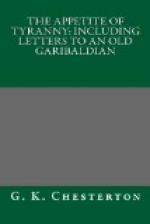If the German calls the Russian barbarous he presumably means imperfectly civilised. There is a certain path along which Western nations have proceeded in recent times; and it is tenable that Russia has not proceeded so far as the others: that she has less of the special modern system in science, commerce, machinery, travel or political constitution. The Russ ploughs with an old plough; he wears a wild beard; he adores relics; his life is as rude and hard as that of a subject of Alfred the Great. Therefore he is, in the German sense, a barbarian. Poor fellows like Gorky and Dostoieffsky have to form their own reflections on the scenery, without the assistance of large quotations from Schiller on garden seats; or inscriptions directing them to pause and thank the All-Father for the finest view in Hesse-Pumpernickel. The Russians, having nothing but their faith, their fields, their great courage, and their self-governing communes, are quite cut off from what is called (in the fashionable street in Frankfort) The True, The Beautiful and The Good. There is a real sense in which one can call such backwardness barbaric; by comparison with the Kaiserstrasse; and in that sense it is true of Russia.
Now we, the French and English, do not mean this when we call the Prussians barbarians. If their cities soared higher than their flying ships, if their trains travelled faster than their bullets, we should still call them barbarians. We should know exactly what we meant by it; and we should know that it is true. For we do not mean anything that is an imperfect civilisation by accident. We mean something that is the enemy of civilisation by design. We mean something that is wilfully at war with the principles by which human society has been made possible hitherto. Of course it must be partly civilised even to destroy civilisation. Such ruin could not be wrought by the savages that are merely undeveloped or inert. You could not have even Huns without horses; or horses without horsemanship. You could not have even Danish pirates without ships, or ships without seamanship. This person, whom I may call the Positive Barbarian, must be rather more superficially up-to-date than what I may call the Negative Barbarian. Alaric was an officer in the Roman legions: but for all that he destroyed Rome. Nobody supposes that Eskimos could have done it at all neatly. But (in our meaning) barbarism is not a matter of methods but of aims. We say that these veneered vandals have the perfectly serious aim of destroying certain ideas which, as they think, the world has outgrown; without which, as we think, the world will die.




